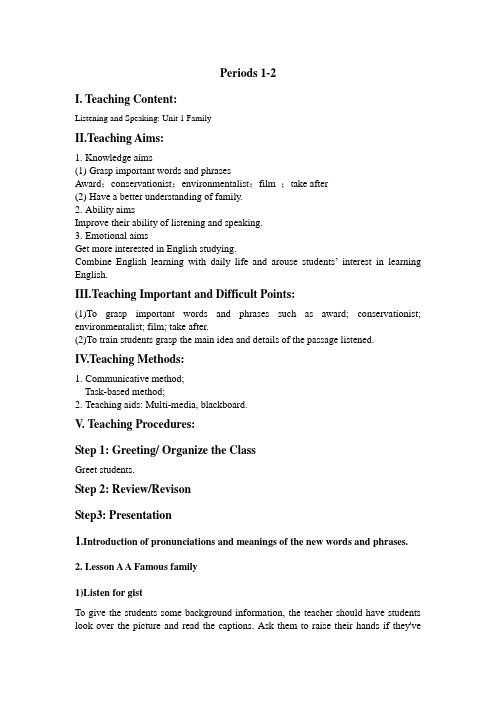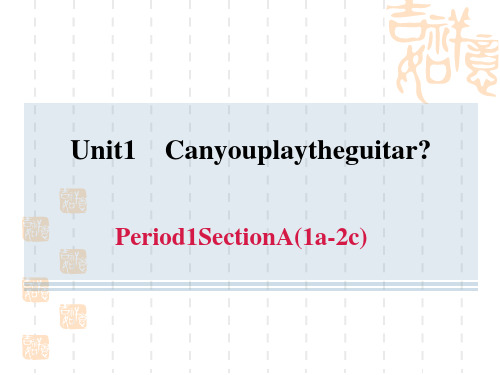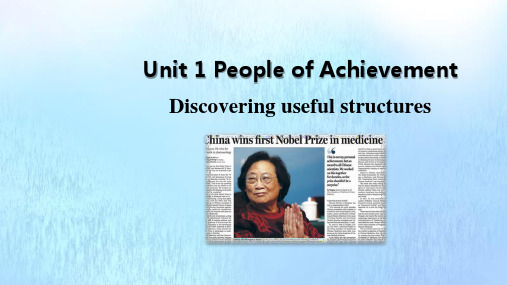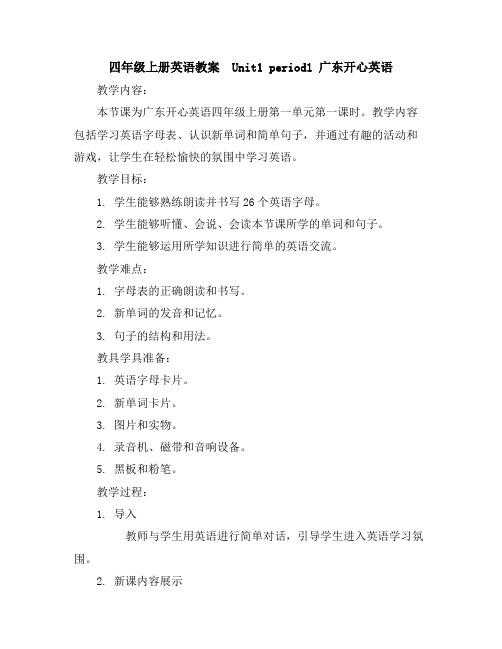Unit 1 Period1-2新
大学英语教案unit1 period1-2

Periods 1-2I. Teaching Content:Listening and Speaking: Unit 1 FamilyII.Teaching Aims:1.Knowledge aims(1)Grasp important words and phrasesAward;conservationist;environmentalist;film ;take after(2)Have a better understanding of family.2.Ability aimsImprove their ability of listening and speaking.3.Emotional aimsGet more interested in English studying.Combine English learning with daily life and arouse students’interest in learning English.III.Teaching Important and Difficult Points:(1)To grasp important words and phrases such as award; conservationist; environmentalist; film; take after.(2)To train students grasp the main idea and details of the passage listened.IV.Teaching Methods:municative method;Task-based method;2.Teaching aids: Multi-media, blackboard.V. Teaching Procedures:Step 1: Greeting/ Organize the ClassGreet students.Step 2: Review/RevisonStep3: Presentation1.Introduction of pronunciations and meanings of the new words and phrases.2. Lesson A A Famous family1)Listen for gistTo give the students some background information, the teacher should have students look over the picture and read the captions. Ask them to raise their hands if they'veheard of Jacques Cousteau or any of his family members. Elicit predictions about how Jacques Cousteau and Alexandra Cousteau are related. The aim of the first listening is to catch the main idea of the material.2)Listen for detailsPoint out that they need to match the years with events.3.Lesson B Brazil’s Changing Families1)Pre-listening taskRead the following question and discuss with a partner.In what ways has the makeup of the Brazilian family changed in recent times?2)Listen for gist.Listen to the recording once and answer the questions on the book. Tell students that they are going to listen to how family size in Brazil is changing.3)Listen for detailsTo help students achieve maximum understanding of the material.Step 4: ConsolidationAsk students to tell the main ideas of each material.Step 5: Assignment/ homeworkAsk students to review the important words and phrases .VI.Teaching ReflectionStudents’ listening ability is not very good, they need a lot of practice to improve listening and speaking. The teacher should do more practice.。
Starter_Unit1_Period1(1a-2e)全英版教案

Starter Unit1 Period1(1a-2e)教案Teaching Aims1. Knowledge Objects:(1) Function:Students learn to write letters A— H regularly.(2) Key V ocabulary:good, morning, hi, hello(3)Target Language:①Hi, Bob!②Hello, Frank!Hello, Eric!③Good morning, Dale!2. Ability Objects:To greet properly when they meet people.3. Moral Objects:English is very important in our daily life, work and study, so we should do our best to learn it well.Teaching Key PointsTo greet people politely and write A— H correctly and regularly.Teaching Difficult PointsTo write A—H correctly and regularly.Teaching MethodsListening and speaking methods; Group workTeaching AidsA tape recorder; Some color cards; ProjectorTeaching ProceduresStep 1 A song (About 2 minutes)Listen to a “Good morning!” song. Then Ss learn to sing this song.Step 2 Introduction (About 8 minutes)Come into the classroom and greet the class with a smile and say “Good morning!”Now, introduce the words “teacher” and “class” by using gestures. Repeat this several times and have the class repeat after you. You may want to leave the class and come in again to introduce the usual “Good morning” routine. Say “Good morning, class”. Help students respond with “Good morning”. Point to yourself and say “I’m Miss/Mr.”… Have them repeat. Explain the terms Miss and Mr. in Chinese.Repeat this a few times with rows and individuals.Miss, Mr.…(Ss repeat)Morning, Miss/Mr.… (Ss repeat)Good morning, Miss, Mr.…(Ss repeat)Step 3 Listen and repeat (About 5 minutes).1. T: Open your books, turn to page 1. There are 8 students in the picture. (按图片上的人物数)One, two, three, four, five, six, seven, eight. Their names are:Grace, Bob, Dale, Helen, Eric, Frank, Cindy and Alice. (可以通过大屏幕展示第一页上的彩图,然后再展示单张图片,并分别与名字相对应。
外研社高以英语必修一Unit1Period2Understanding ideas

Book1 Unit1 A New Start
Period 2 My first Day at Senior High
教材分析
本节课是高一英语的第二节课,以日记形式讲述孟浩第一天迈入学校大门的见闻和感受。
语篇分析
该语篇类型为日记,关于入学第一天的经历和感受。
学情分析
已有基础:了解日记格式,能够在猜测文章主旨大意。
存在障碍:纠结于不会的单词不会自主阅读;没有建立科学系统的阅读程序,拿到一篇文章没有目的的阅读,最终梳理不出结构,探索不出阅读的意义。
发展需求:阅读日记的方法,关注点;模仿作者行文逻辑,整理出符合自己需要的表达进行输出。
教学目标
通过本节课的学习,学生能够
1.借助音标巩固新词汇。
2.梳理文章两条主线复述课文。
3.初步认识阅读需要关注的点包括:标题(推断引领作用),每段的主题句对于衔接文章的作用,梳理出描写见闻感受需要用到的表达和行文顺序。
教学重点
1.借助音标巩固新词汇。
2.感知科学的阅读顺序和方法。
教学难点
1.准确快速地复习音标知识并拼读会新单词。
2.借助关键词猜测段落大意,关注标题和语篇特点。
3.能够尝试用课文语言复述故事和作者感受。
评价活动
活动一~四通过观察对比总结定语的作用,结构,关系代词用法完成目标一二。
活动二通过梳理文章结构获取介绍朋友的要点信息,改写含有定语从句的句子完成目标三
活动三通过访谈节目,完整自然介绍自己的好友完成目标三
教学过程
Reflection。
Unit1Period1教案

八年级下册第一单元第一课时教案Unit1 Will people have robot?Period1Lesson plan background(教材背景):In the contemporary society, a country, a nationality should have ideal, youth is the future of the country, more should have ideal, the ancients cloud: young strong kingdom is strong! So, our children what exactly is the ideal? How are they planning our future? They think that the next few years later, we would be what look like? Our society is what look like? Our world is what look like? This lesson is at this time background, lead students looking to the future!Analysis of the teaching material(教材分析):Teaching objectives:1.能识记Words & phrases: robot, paper, less, fewer, simple,unpleasant, factory, seem, etc .2.学习并能应用will 构成的一般将来时态的陈述句、否定句、疑问句及回答.3.There be 句型的一般将来时.4.more , less , fewer 的用法.5.学习一般将来时态的相关知识,学会对未来进行预测.Important and difficult points :1.will构成一般将来时态的句式。
人教版七年级下册英语unit1 Period 1 Section A (1a-2c)

HelikesplayingXiangqi.
hess
9.—Canyoudpictures?—No, Ican't.
10. Davidlikeslrisatweningtomverymuch.
usic
三、用括号内所给词的适当形式填空 1. Mysistercan________p_l_ay(play)theguitar. 2. Iwant__________(join)theartclub.
D
She________7playingtheguitar,
too.
Andsheplaysitverywell. Whenher________8isbusy,
shehelpstoteachmetheguitar.
WuQianisgood________9me.
( C)7. A. knowsB. asksC. likesD. shows
3. 我想加入游泳俱乐部。 Iwantto______jo_itnhesw__im__m__in_g_c_l_u_b_______.
4.——安想加入什么俱乐部? ——音乐俱乐部。
—Whatclub________Annwantto________? —The________cludbo.esjoin
一、语法填空
阅读下面短文, 按照句子结构的语法性和上下文连 贯的要求, 在空格处填入一个适当的词或使用括号 中所给词的适当形式填空。
Hello,
I'mLucy.
Icanplaybasketball.
________1Icanplaysoccer, too.
And
Байду номын сангаас
SoIwant____t_o_j_o_in2 (join)asportsclub. Whataboutyou,
高中英语Unit1 Period2 课件新人教版选择性必修第一册

Practice——Rewrite the sentences using nonrestrictive relative clauses. (P5 Activity 2)
Q1 Read the example, Can you summarize the steps to rewrite the sentences? Example: The book tells us about Alexander Fleming. He discovered penicillin. The book tells us about Alexander Fleming, who discovered penicillin.
of the treatment for malaria.
non-restrictive
Observe and Analyse
Read the following sentences and underline the relative clauses. Then name the two types of clauses and state their functions. ( P5 Activity 1 )
team drew out the artemisinin, for which Snhone-rwesatrsictaivwe arded the 2015
Nobel Prize for Physician or Medicine. Hundreds of thousands of lives
are thought to be saved by Artemisinin, which has become a vital part
Aspect(方面) Restrictive relative clauses
高二英语新教案Unit1-Unit2

高二新教材Unit1The first PeriodTeaching Steps:Step1 warming up1.T: There are many outstanding scientists in the world who made great contributions tosociety and science. Now make a list of the names of some scientists and their contributions.Maria curie ------ radioactivityZhang Heng ------ seismographThomas Edison ------ light bulbCharles Darwin-------The Theory of EvolutionAlbert Einstein ------ The Theory of RelativityT: Well done. What do you think makes a successful scientist?(Discussion)B: much imagination , intelligent , creative, hard—working, confident, curious, careful. 2.Look at the pictures in the book. Have the students read he quotes and discuss what thequotes mean in class.3.have the students present more quotes they know about science and thinking.Step2 listening1.Go through the requirements first ,and then listen to the descriptions of some famousscientists to get the main idea.2.play the tape again and finish the exercise.3.check the answers.Step 3.Speaking1.Work in groups of five. Each group member represents a branch of science, and debate eachother to see which branch of science is the most important and useful for society. They should prepare their role cards and then debate each other.2.Ask one group to present their debate in class.Example:S1: I think biology is the most important and useful science because people can not live without living things. If there were no science of biology, there would not be medicine.S2: Well, maybe.But I think chemistry is the most important and useful ,because chemistry is the key to the progress of the human being. Besides, it is chemical reaction that produces many new things.S3: It is hard to say .There are many physical products. And physics is widely used in many fileds, such as medicine, industry and agriculture. There would be no life without physics. So I think physics is the most important and useful for science.S4: That’s true. But maths is the basic science.You can not learn physics or chemistry well without a good knowledge of maths. Maths is a tool in science and engineering .Therefore, maths is the most important and useful sci ence. What’s your idea?S5: Well,there’s no doubt that maths is an important and useful science .In my opinion,the most important and useful science should be computer science in our modern information society. The computer is now an indispensable tool in many fileds. It can settle all kinds of problems at a high speed and can help people work easily. So I think computer science is the most important and useful science.Step 4. Homework1.Collect more quotes after class.2.Preview the reading text----“No Boundries”.The second PeriodTeaching Steps:Step1.Lead-in1.Introduce and explain the title of the passage.------"Science is no boundries."T: Everyone can study science.and share the results of science.The study of science is never finished.2.Introduce something about Stephen Hawking.Step 2.Discussion1.Read Paragraph One,try to discuss the situation in paris.Imagine this : you are a ….2.Then ask two students to tell how they would feel and what they would do .S1: I won’t give up my d reams.I will spend all my rest time having fun.I will travel around the world and eat different kinds of food in the world…Step3.Reading1.Read the passage and find out the answers to the following questions:a.What did Stephen Hawking feel after he was told that he had anincurable disease.b.What did he do ?He went to his research and got his PhD.c.Why did Stephen Hawking need a PhD?In order to get married.d.When did Hawking become famous?In the early 1970s.e.When did Hawking visit Beijing?In 20022.After several minutes,ask five students to answer the questions.3.Explain some language points :a. There didn’t seem much point in doing sth =there is no point in doingsth .e.g There is no point arguing with him.b. work one.g He is working on his composition.c. go bye.g He went by my house yesterday.d. be/get engaged to sbe.g He got engaged to Mary last month.e. in order to ….e.g. In order to study English,he listens to English songs. In order tolisten to English songs,he often buys English tapes.f. go on withe.g After a short rest,he went on with his study.g. Nor did he let the disease stop him from living the kind of life he hadalways dreamt of .=He didn’t let the disease stop him from living the kind of life he had always dreamt of .stop sb from doing sth / dream ofh. make a discoveryI. Turn out ( to be )The experiment turns out to be very successful .Step 4. Listening and reading1.Play the tape,and let the students listen and read after it.2.Have them read the text aloud.Step 5. Post-reading1.Finish the exercises in the post-reading part.2.Check the answers.Step 6. Consolidation1.Raise any problems they have .Step 7. Homework1.Read the text after class2.Write all the phrases and important points in the exercise book3.Write a passage about Stephen Hawking.The third PeriodTeaching Steps:Step1.Revision1.Read the text aloud.2.Read the words in the unit.Step2.Word Study and Practising1. Choose the closest meaning to the underlined word in Word Study.seek:search for obvious:easily seenGravity:the natural force that attracts objects towards the earth’s centre.Predict:tell before it happens observe:look carefully atmatch:look exactly like2. Do Ex 1 in the WB. Pick out the sentences in which the underlined words are used with the same meaning as they have in the text.3.Do Ex.2 in the WB. Complete the sentences by choosing the correct word from the pairs inbrackets.e.g A microscope can make small objects look much larger.Step 3. Grammar1. Explain the use of the Infinitive:The Infinitive:a. subject :(主语) To learn English is important.It’s important to learn English.b..predicative:(表语)常放在BE动词后面My job is to clean the classroom.c.Object:(宾语) 放在谓语动词后面I want to go . I find it important to learn English.d.Attribute:(定语)放在名词后,修饰名词I have much homework to do .e.Adverbial:(状语)放句首或句末,表目的、结果或原因等We came here to learn English.(表目的)We arrived at the station only to find that the train had gone.(表结果)I am glad to meet you .(表原因)f.The passive tense:It is honour to be invited to the palace.Step 4.Exercises1.Do some exericises in the WB…Step 5 Homework1.Revise the grammar and finish the workbook exercises.Period 4Teaching steps:Step1.Revision1.Revise the Grammar-----the Infinitive﹙1﹚I study medicine in the college.___To become a doctor_____ is my dream.﹙2﹚I like drawing pictures.My hobby is __to draw pictures.﹙3﹚It’s an interesting novel.I find it _interesting to read﹙4﹚I am hungry . I would like something___to eat _____.﹙5﹚I study hard __to go to college_.﹙6﹚I am sorry to _hear that _.2.Read the text----“No boundries”.Step 2. Reading1.Go through the text----Making a difference ,and find out the names of the scientistsmentioned in the passage.Then discuss what they are famous for in the class.(Q1)Stephen Hawking . Galileo Galilei (Prove the theory of Copernicus that the earth moves around the sun .). Francis Bacon. ZhangHeng (invented seismograph;draw maps of heavens and stars). Copernicus.2.Go through the text again and conclude the characteristics of great scientists mentioned inthe passage . (Q2)( curious ,creative ,believe in what we do , find out what we like to do and what they are good at )Then discuss which one is the most important ,and give the reasons for it .Step 3. Language points1.Explain some language points and difficult sentences in the reading text.﹙1﹚be satisfied withHis parents were satisfied with his girl-friend.﹙2﹚take a look atI took a look at the map .﹙3﹚what ifBy asking why,how ,and what if,curious minds find new ideas and solutions.What if we move the picture over here ?﹙4﹚the other way aroundThe earth moves around the sun,not the other way around.We should turn left ,not the other way around.﹙5﹚He built a model that could move in order to show the position of the stars changed from season to season..﹙6﹚It was only later that the world recognized his greatness.﹙7﹚Knowing who we are means knowing how we think and what we like to do .﹙8﹚Only by discovering what we do best can we hope to reach our goals and truly make a difference. =We can hope to reach our goals and truly make a difference only by discovering what we do best .Step 4. Listening and reading1.Play the tape. Have the students read after the text .2.Read the text aloud by themselves.Step5.Writing and Checkpoint1.Write a passage about a scientist ..2.Go through the checkpoint .Revise the use of the Infinitive.Step 6. Homework1.Finish the passage after class.2.Finish a paper .3.Write down all the phrases in the unit.高二英语Unit2教案(新教材)Period 1Teaching Steps:Step1. Revision1.Have a dictation in class.2.Read the new words in the period.media, reliable, fire, face, difficulty, nosy, Gray, editor, reason, elect, go up, burn down, injure, rumorStep2.Warming up1.T: Today we will talk about the news media…Wh at kind of news media do you know ?Ss: radio ,internet, TV, newspaper, books, magazines, etc2.Go through the questions below the pictures in the book, and then have the studentsdiscuss the questions in class.﹙1﹚Which of the news media above is the most reliable? Why?I think that newspaper is the most reliable , because …..﹙2﹚How are the media above different from each other?For radio,the host broadcasts some news ,and then the audiences listens to it .For TV ,the host reports some news ,and then the audiences watch it .For magazines or newspapers, the editors or the writers write the articles and then the readers read them. For internet, web designers design the pages and then people can read them from internet .﹙3﹚How do you know whether what you hear, see or read is true ?We can compare the information from TV, newspaper, internet .And then analyse the information and decide whether they are true or not .We can also discuss with our friends or family.﹙4﹚Do you know how a newspaper is made ?What about a magazine?People collect information or interview some people .And then analyse and write some articles .At last ,they print them in the newspaper.﹙5﹚What words will you need to talk about news and the media?journalist ,reporter, news item, article, headline, front page, current affairs, interview,host, cover, presenter, editor, reliable, biased, ads, etc.Step3.Listening1.Go through the instructions and questions before listening to the tape. Have them guesswhat they will hear on the tape.2.Play the tape. And let the students answer the questions.3.Check the answers ,and then discuss the speakers’ different attitudes towards Mr Gray.Step4.Speaking1.Go through the instructions and then classify the list of ten things that happened today. International news: 200 people died in an earthquake in Turkey.France elected a new president.National news: Two men robbed a bank in Shanghai.Food prices are going up .A Chinese scientists has invented a new car engine that does not pollute the air.local news: Three children from your city were killed .A house in your city burnt down. Nobody was injured .2000 people in your city moved into new buildings today and were happy.There is a rumour that a large company wants to build a factory in your city.sports news: China best Brazil 2-1 in football.2. Discuss and choose five news items for a newspaper. They can use different criteria for making the decisions, eg what do the readers want to know about, what items are more important, etc.3.Students present their choices in class.Step5.Homework1.Preview the next lesson.2.Write down a short passage about which five items to put in the newspaper and thereasons .The Second PeriodTeaching Steps:Step 1.Revision1.Have the students talk about their decisions they made in the speaking part.Step2 New words1.Read the new words in the reading text.Step3.Pre-reading1.Look at the tile and the pictures, and then guess which questions the text till answer.Step 4.Reading1.Go through the first paragraph with the students, then get the main idea of the wholepassage.2.Have the students read the text, and then get what the two reporters answered in theinterview.﹙1﹚How do they decide what they are going to write?e. g. Discuss with the editor, interview some people, etc﹙2﹚Which of the articles that they have written do they like best?Chen Ying: about the efforts to bring stolen cultural relics back to ChinaZhu Lin: about an ordinary young woman who tried to adapt to her new life afterhaving studied abroad .﹙3﹚What would they write about if they could write any article they want?Zhu Lin: about music, art, nature, and the importance of spiritual fulfillment.Chen Ying: about people whom people seldom read about .Step nguage points﹙1﹚more thanHe more than smiled, he laughed outright.﹙2﹚relate toThe article relates to the cultural relics.﹙3﹚switch roles﹙4﹚for onceFor once, he was won.﹙5﹚rather thanHe is a writer rather than a teacher.﹙6﹚adapt toIt’s hard to adapt to new situation.﹙7﹚be addicted toThe child is addicted to computer games﹙8﹚even ifI’ll help you, even if I have to help for a night.﹙9﹚draw attention toThe professor drew our attention to the air pollution.﹙10﹚on all sidesYou may see it on all sides.Step 6.Listening and speaking1.Play the tape, and the students listen carefully.2.Have the students read the passage ,and raise any problems they have .3.Answer the questions in the post-reading part.Step7.Homework1.Read the passage after class.2.Remember all the language items in the period.Period 3Teaching Steps:Step 1. Revision1.Read the reading text aloud.2.Read the words learnt in the last period.Step 2. Word Studyplete the sentences with the verbs in the box. Change their forms if necessary.2.Check the answers.3.Look at the words in the Ex. 2. and put them into three groups according to their meanings:positive , negative or neutral.Positive: reliable, experienced .informed talented ,.balancedNeutral: unique ,printed, socialNegative: nosy. careless, awful, addictedStep 3. Grammar1.Look at the sentences from the text of the last period .Work in pairs to translate eachsentence into Chinese and then tell if he past participle in it is used as attribute or predicative.Attribute: experienced , informed . talented, organized , stolen, addicted, printedPredicative: needed , respected, tolerated.2.Rewrite each past participle that is used as attribute with the attributive clause in Ex.2.e.g. informed decisions== decisions that are informed.3.Rewrite the sentences in Ex.3 with the past participle.4.Change the underlined part into a past participle phrase and then make a sentence with it inEx.4.5.Read the news in the Ex.5 and fill in the blanks with the correct form of the words in brackets.They can discuss with their partners.Note: Tell them the different usages of the past participles (-ed) and the present participles(-ing) .Step 4. Consolidation1.Review the usages of the past participles as attribute and predicative.Step 5. Homework1.Finish the exercises in the WB.he Fourth PeriodTeaching Steps:Step 1. Revision and Lead-inplete each sentence with the right forms of the verbs in brackets.﹙1﹚I had nothing to do .I was _bored (bore) and lonely.﹙2﹚Jack looked even more amazed (amaze) than he left.﹙3﹚The results were very disappointing .(disappoint)﹙4﹚I was thanked by the satisfied (satisfy) customer.﹙5﹚The girl dressed (dress) in red is my daughter.﹙6﹚Last Monday our class went on an organized (organize) trip.Step 2. New words1.Learn the new words in this periodtrouble-maker, responsible ,caring ,polluter, arm, comparison, update, checklistStep 3.Reading1.Play the tape .The students listen to the two reports and discuss which one is reportedtruthfully in pairs.2.Read the reports carefully and discuss the questions in the students book.﹙1﹚How are the reports different?Report One Report TwoTrouble-maker responsible ,caring citizen who love nature and planet ,rude ,noisy brave, strongMost successful company polluterCaused trouble, make it difficult talk to workers and left positive messagesfor the workers to get into the factory﹙2﹚Who do you think wrote each report?The first writer supports the company ,while the second writer supports thecitizens.﹙3﹚What do you think are facts and what are opinions?Some citizens demonstrated outside a factory to protect the nature and our planet.﹙4﹚What would be a good headline for each story?a. Trouble-makers stop wokers.b. Activists protest against polluter﹙5﹚What pictures would you use ? Why ?Step 4. Reporting1.Choose one of the events and write a short newspaper article about it2.Ask two students to present their articles.Step 5. Writing1.Go through the instructions for writing a comparison passage.pare two different kinds of media, and then write a comparison passage. Step 6. Homework1.Finish the writing after class.。
四年级上册英语教案-Unit1period1广东开心英语

四年级上册英语教案 Unit1 period1 广东开心英语教学内容:本节课为广东开心英语四年级上册第一单元第一课时。
教学内容包括学习英语字母表、认识新单词和简单句子,并通过有趣的活动和游戏,让学生在轻松愉快的氛围中学习英语。
教学目标:1. 学生能够熟练朗读并书写26个英语字母。
2. 学生能够听懂、会说、会读本节课所学的单词和句子。
3. 学生能够运用所学知识进行简单的英语交流。
教学难点:1. 字母表的正确朗读和书写。
2. 新单词的发音和记忆。
3. 句子的结构和用法。
教具学具准备:1. 英语字母卡片。
2. 新单词卡片。
3. 图片和实物。
4. 录音机、磁带和音响设备。
5. 黑板和粉笔。
教学过程:1. 导入教师与学生用英语进行简单对话,引导学生进入英语学习氛围。
2. 新课内容展示a. 教师展示字母卡片,引导学生跟读并书写。
b. 教师展示新单词卡片,引导学生跟读并记忆。
c. 教师通过图片和实物,引导学生学习新句子。
3. 练习与活动a. 学生分组进行字母接龙游戏。
b. 学生进行新单词的记忆大赛。
c. 学生进行角色扮演,练习新句子。
a. 教师与学生一起回顾本节课所学内容。
b. 学生进行课堂小结,分享学习心得。
板书设计:1. 字母表2. 新单词3. 句子作业设计:1. 抄写字母表三遍。
2. 抄写新单词和新句子各五遍。
3. 家长签字,确认孩子完成作业。
课后反思:本节课通过丰富的教学活动和游戏,激发了学生学习英语的兴趣。
学生在愉快的氛围中掌握了字母表、新单词和句子。
但在教学过程中,部分学生对于新单词的记忆仍存在困难,需要在今后的教学中加强巩固。
教师应关注学生的个体差异,给予每个学生充分的参与和表达机会,提高课堂效果。
本节课达到了预期的教学目标,但仍有改进和提升的空间。
教师应不断反思和调整教学方法,以更好地适应学生的学习需求。
重点关注的细节:新单词的记忆和句子的结构及用法详细补充和说明:新单词的记忆是英语学习的基础,而句子的结构及用法则是英语学习的核心。
- 1、下载文档前请自行甄别文档内容的完整性,平台不提供额外的编辑、内容补充、找答案等附加服务。
- 2、"仅部分预览"的文档,不可在线预览部分如存在完整性等问题,可反馈申请退款(可完整预览的文档不适用该条件!)。
- 3、如文档侵犯您的权益,请联系客服反馈,我们会尽快为您处理(人工客服工作时间:9:00-18:30)。
Ask and answer
--How tall is …? --He is … centimetres
tall
--How much does … weigh? --He weights …kilograms.
Read aloud
Joe: Do you do a lot of exercise? George: Yes, I usually play basketball and table
Oxford English
1 You and me
Period 1
Read aloud
Joe is visiting his cousin George in the countryside.
Joe: George, how tall are you? George: I’m 152 cm tall. What about you? Joe: I’m 150 cm tall. George: Oh, I’m 2 cm taller than you.
5. What can Joe do near his home? He can go to museums.
Name
Age
Danny
12
Mark
13
Байду номын сангаас
Lisa
12
Weigh(kg) 46 50 39
Height(cm) 146 160 150
Hobbies swimming painting going to the cinema
How much do you weigh? Joe: I weigh 47 kg. What about you? George: I weigh 40 kg. Joe: Oh, I’m 7 kg heavier than you. George: Do you meet the standard? Joe : No, I don't. I’m a little overweight.
tennis after school. Joe: I usually play football after school. I’m a
football fan. George: Sometimes I go fishing with my grandpa. Joe: How exciting! I don't go fishing often.
There's no river near my home. George: But you can go to museums. That's fantastic!
Ask and answer
1. What does George usually do after school? He usually plays basketball and table tennis after school. 2. What does Joe usually do after school? He usually plays football after school. 3. What does George sometimes do? He sometimes goes fishing with his grandpa. 4. Does Joe often go fishing? Why or why not? No, he doesn't go fishing often because there’s no river near his home.
看上面的表格,说一说写一写每个小朋友的情况。 Danny is 12 years old. He weighs ____________________. He is _________________________tall. He likes ___________________________.
And you? George: I don't either. I’m a little slim.
I’m …(name). I’m…centimetres tall. I weigh … kilograms. I…
How tall are you? How much do you weigh?
